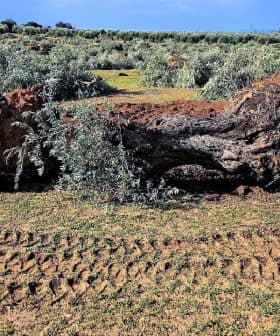BBC: Number of ‘Extremely Hot Days’ Each Year Is Rising
A BBC report found that the number of days with temperatures that surpass 50 ºC has nearly doubled in the past 40 years.
 Bronx, New York
Bronx, New York Temperatures exceeding 50 ºC are becoming increasingly common worldwide, leading to more frequent and severe heatwaves that impact human and animal health. The rise in extreme heat events is a result of increasing greenhouse gas emissions, with experts urging quick action to reduce emissions and develop new coping strategies to mitigate the effects of rising temperatures.
A growing number of locations throughout the world are experiencing temperatures higher than 50 ºC, according to a BBC analysis.
The heatwaves, which affect human and animal health, are happening increasingly often, the BBC said.
We need to act quickly. The faster we cut our emissions, the better off we’ll all be.
In the 1980s, scientists had found that extremely hot days, with temperatures exceeding 50 ºC, were unevenly experienced by a number of locations – 200 at most.
However, since the 2000s, this number has rapidly increased, rising to somewhere between 220 and 480. These locations also experience double the number of extremely hot days compared with 40 years ago.
See Also:Climate Change Coverage“The total number of days above 50 ºC has increased in each decade since 1980,” the BBC said. “On average, between 1980 and 2009, temperatures passed 50 °C about 14 days a year. The number rose to 26 days a year between 2010 and 2019. In the same period, temperatures of 45 °C and above occurred on average an extra two weeks a year.”
2021 has seen a few heat records already broken, with southwestern Canada recording a record-high 49.6 ºC. Meanwhile, Siracusa, Sicily, experienced its own unprecedented heat this summer, reaching 48.8 ºC.
On top of that, many of the world’s broken heat records had only been set in 2020. According to data published by the Copernicus Climate Change Service, 2020 was 0.6 ºC warmer than the standard 1981 to 2010 reference point and 1.25 ºC above pre-industrial levels.
While announcing the latest United Nations report on climate change last month, the U.N. Secretary-General António Guterres said “the evidence is irrefutable: greenhouse gas emissions are choking our planet and placing billions of people in danger. Global heating is affecting every region on Earth.”
“We need to act quickly,” Sihan Li, a climate researcher at the University of Oxford, told the BBC. “The faster we cut our emissions, the better off we’ll all be.”
“With continued emissions and lack of action, not only will these extreme heat events become more severe and more frequent, but emergency response and recovery will become more challenging,” she added.
See Also:Editors from 200 Health Journals Warn Climate Change Is Creating Global Health CrisesCurrently, 300 million people live under heat stress conditions, according to a Rutgers University report cited by the BBC. The researchers believe that should protective measures and curtailing strategies not be enforced, in 2100 more than 1.2 billion people could live their lives under a heat stress cap.
The rising temperatures are changing peoples’ lives, altering the landscape with wildfires, contributing to desertification and harming farming operations worldwide.
However, this is pushing scientific research toward developing new coping strategies, one of which directly involves the olive tree. The Mediterranean basin, to which the olive tree is endemic, is set to undergo significant changes in the next decades as temperatures in the Mediterranean basin are predicted to rise more quickly than the rest of the world.
A recent study published by Israel’s Agricultural Research Organization confirmed that rising temperatures affect the olive production cycle and olive oil quality.
The researchers said to adapt to growing unpredictable seasons and to extreme weather events, new agronomics solutions will have to be deployed. They added further research must be done to identify olive cultivars with higher resilience to heat.
Living at 50 °C has implications that have yet to be fully investigated, the BBC concluded. The United Kingdom’s national broadcaster announced a new documentary series that will explore the most affected locations and how local residents are coping.
Share this article









